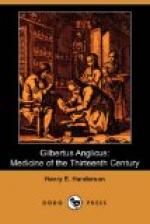The surgical chapters of the work are unique in a compendium of medicine, and merit even more favorable criticism.
The discouragement of the practice of medicine and surgery on the part of ecclesiastics by the popes and church councils of the twelfth century, culminating in the decree of Pope Innocent III in 1215, which forbade the participation of the higher clergy in any operation involving the shedding of blood (Ecclesia abhorret a sanguine); the relatively scanty supply of educated lay physicians and surgeons, and finally the pride and inertia of the lay physicians themselves; all these combined to relegate surgery in the thirteenth century to the hands of a class of ignorant and unconscionable empirics, whose rash activity shed a baleful light upon the art of surgery itself. As a natural result the practice of this art drifted into an impasse, from which the organization of the barber-surgeons seemed the only logical means of escape.
The earliest evidence of the public surgical activity of the barbers, as a class, is found, I believe, in Joinville’s Chronicle of the Crusade of St. Louis (Louis IX) in the year 1250. According to Malgaigne, no trustworthy evidence of any organization of the barbers of Paris is available before 1301, and the fraternity was not chartered until 1427, under Charles VII. The barbers of London are noticed in 1308, and they received their charter from Edward IV in 1462. The parallel lines upon which the confraternities of the two cities developed is very noticeable—making due allowance for Gallic enthusiasm and bitterness.
Lanfranchi, the great surgeon of Paris, about the year 1300 is moved to write as follows:
“Why, in God’s name, in our days is there such a great difference between the physician and the surgeon? The physicians have abandoned operative procedures to the laity, either, as some say, because they disdain to operate with their hands, or rather, as I think, because they do not know how to perform operations. Indeed, this abuse is so inveterate that the common people look upon it as impossible for the same person to understand both surgery and medicine. It ought, however, to be understood that no one can be a good physician who has no idea of surgical operations, and that a surgeon is nothing if ignorant of medicine. In a word, one must be familiar with both departments of medicine.”
Now Gilbert by the incorporation of many chapters on surgery in his Compendium inculcates practically the same idea more than fifty years before Lanfranchi, and may claim to be the earliest representative of surgical teaching in England. Malgaigne, indeed, does not include his name in the admirable sketch of medieval surgery with which he introduces his edition of the works of Ambroise Pare, and says Gilbert was no more a surgeon than Bernard Gordon. This is in a certain sense true. Gilbert was certainly not an operative surgeon. But it needs only a




